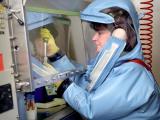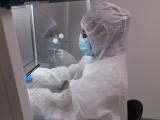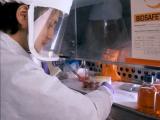Jun 1, 2005 (CIDRAP News) – The World Health Organization's (WHO's) plan to build an international emergency stockpile of smallpox vaccine drew support from member countries at their recent annual meeting in Geneva.
The World Health Assembly (WHA) "welcomed progress on WHO's work to establish a global smallpox vaccine reserve," the WHO said in a statement during the meeting, which ended last week.
The effort involves a vaccine stockpile at WHO headquarters in Geneva, plus additional supplies held in participating countries and pledged to WHO for use in an emergency. The agency said it now has 2.5 million doses in Geneva, and member countries have pledged 31 million doses. That includes 20 million doses from the United States and 5 million from France.
A recent report by the WHO Secretariat says plans call for increasing the Geneva stockpile to at least 5 million doses and boosting the reserves held by participating countries to at least 200 million doses. The vaccine would not be used unless smallpox actually re-emerged.
The American pledge of 20 million doses was announced by Tommy Thompson, then secretary of health and human services, last December. Thompson said the nation had more than 400 million doses at that time.
The WHA also took a somewhat wary look at two recommendations on smallpox research made by a WHO advisory committee last fall.
In November, the WHO Advisory Committee on Variola Virus Research recommended inserting a green fluorescent marker protein into variola (smallpox) virus to facilitate screening of possible antiviral drugs, the WHO said. "The virus glows green when exposed to an ineffective drug, thus allowing rapid distinction between ineffective and potentially effective drugs against smallpox," the statement said.
In the WHA discussion of this recommendation, WHO spokeswoman Christine McNab told CIDRAP News by e-mail, "The main concerns were for biosafety and biosecurity. Therefore, any proposals to carry out this kind of research would be very carefully examined with these issues in mind before any research was actually approved." The WHO statement said further that the advisory committee would examine research proposals one at a time.
The advisory committee also had recommended that researchers be allowed to splice smallpox virus genes into other, less dangerous orthopox viruses for the purpose of testing possible drugs without using the smallpox virus itself. But WHO Diector-General Lee Jong-wook recommended that the committee reconsider that idea, and the WHA concurred with his recommendation, according to McNab.
The WHA didn't take a formal vote on the research recommendations, according to McNab and media reports.
A report by Science magazine's Sciencenow service said more than half of almost 20 national delegates who spoke at the WHA session voiced worries about the smallpox research proposals. Some urged the WHO to set a firm deadline for the destruction of all remaining stocks of smallpox virus, and others advocated more input from developing countries on the smallpox research agenda, the report said.
Smallpox was declared eradicated in 1980, but supplies of smallpox virus are held in two WHO-approved laboratories, one at the US Centers for Disease Control and Prevention and one at a national lab at Koltsovo in Russia. The WHA recommended in 1996 that the virus stocks be destroyed. But in May 1999 the body authorized keeping the stocks temporarily to allow for medical research, in case the disease resurfaces as a result of bioterrorism.
In 2002 the WHA authorized continued postponement of destruction of the virus, "on the understanding that steps should be taken to ensure that all approved research would remain outcome-oriented and time-limited and kept under review," the WHO said.
At its November meeting, the Advisory Committee on Variola Virus Research concluded that no further research involving live smallpox virus was necessary for the sake of developing rapid diagnostic tests, according to a report by the WHO Secretariat. However, the committee reaffirmed the need for live-virus research to develop better vaccines and antiviral drugs, the report says.
See also:
May 20 WHO news release
http://www.who.int/mediacentre/news/notes/2005/np_wha02/en/index.html
April 2005 report by WHO Secretariat on the global smallpox vaccine reserve
https://apps.who.int/gb/ebwha/pdf_files/WHA58/A58_9-en.pdf
April 2005 report by WHO Secretariat on recommendations by the Advisory Committee on Variola Virus Research
https://apps.who.int/gb/ebwha/pdf_files/WHA58/A58_10-en.pdf















